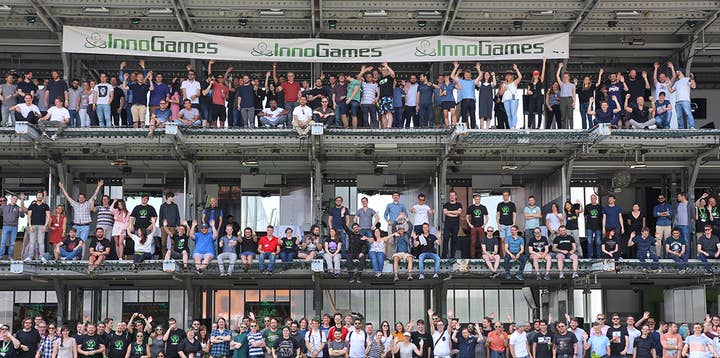Why InnoGames decided to open up about pay
HR director Andreas Michael Lieb and senior PR manager Marc-Philip Morian tell us why the German firm decided to be this transparent about salary
How much employees are being paid is something that is generally shrouded in mystery.
Much of the time staff are discouraged from discussing their compensation, which – among other things – often hides pay disparity based on gender and race.
As a result, there have been calls for greater transparency when it comes to pay. Not everyone is on board with this, but one company which can clearly see which way the wind is blowing is German mobile games firm InnoGames, which published the salary bands for a number of its departments last month.
These roughly laid out what junior, intermediate, senior and elite members of staff earn. It feels pretty comprehensive, too, with “transition” bands, which fit between two salary bands.
"We are living our values. One of those is the idea of fairness [and] it's also about open information sharing"Andreas Michael Lieb
This data has been published internally for some time now. Since 2016, InnoGames has been trying to establish “career models” – how an employee can progress professionally during their time at the company.
Once it had established this, it researched the games market to see what different levels of experience within various specialities were being paid to come up with salary bands. Now it has made this information public.
“Our organisation is very valued-driven,” InnoGames’ director of human resources, Dr. Andreas Michael Lieb, explains. “We are living our values. One of those is the idea of fairness [and] it's also about open information sharing. That’s why we initially said we’d go live with this information, internally at first. It’s also a way to avoid pay gaps.
“By publishing this, people can see what they can earn in a particular role and can then speak on an equal level with their manager why they are earning a certain amount and why they are not being paid more. Employees can then have that discussion on an even playing field.”
When it released this salary information, InnoGames only did so for around 80% of its staff. This is due to some departments having a small number of staff, meaning that publishing this data would likely reveal what individual employees were being paid.
“During this process, we identified that, for example, we have the career model for a starter, a junior, a regular, a senior and maybe an expert, and there are only five people in the department,” Lieb says.
“When you create the salary band to this group, then you more or less know the salary of most of those people. We don't want to have that because we want to respect individual salaries. So that’s why we said that we wouldn’t publish salary band data for groups that are smaller than six people.”

Executive pay is also notably not included in InnoGames’ salary information. Lieb explains that there are a few reasons for this being the case.
“It’s partly to do with size; there are five people in [that] group, so you end up in the same situation I mentioned earlier,” he says.
He adds that the issue is multi-layered as you have to take into account the salary bands for a CMO for a company the size of InnoGames on the market, but also the individual role. While a chief marketing officer would seemingly be in the C-suite salary band, they have a different role to the chief analytics officer (for example) and therefore their pay may be different.
One point that InnoGames was trying to make with the publication of its salary band data was that there isn’t any disparity in how much women make at the company versus men. A lot of companies make these kinds of bold claims, only for it to later emerge that this simply is not the case.
While Lieb admits that both genders haven’t always been paid the same, he says he is confident that this is the case now.
“We published this data internally a year ago,” he says. “It took us many years to get here, don't forget this. It should have been this way from the beginning. We have fixed that now and we are confident. We also informed our employees in advance that we were planning to go live with this a year ago.”
Though InnoGames has been publishing this pay information internally for some time now, it doesn’t have any plans to regularly update the salary bands it releases publicly, at least not in the same way as it has just done. This data, however, will be out there.
“There are some very early talks with Game here in Germany to see if it makes sense to do something on an annual basis" Marc-Philip Morian
“We haven't thought about that at the moment,” Lieb says. “At the end of the day, the bands will always be public because we are including them in our job ads. So if you go 12 months into the future from now and we have an open role for a software developer, for example, you’d look at the job ad, and you would see the salary band. As far as I’m concerned, it's already out there. I don’t need to put all that information in a PowerPoint and present it every year. I’d say there’s no added value, really.”
However, InnoGames is in very early discussions with the German video games trade association Game about publishing information about salary bands in the sector on a more regular basis.
“There are some very early talks with Game here in Germany to see if it makes sense to do something on an annual basis,” senior PR manager Marc-Philip Morian says.
“As Andreas pointed out, just going out there again by ourselves doesn't make much sense. But going out together with others who decided to take the same measure, make the same move, that would be really interesting. So we're in very early talks to make sure that the topic doesn't just go away as so many other topics do.
“We’ve had some good attention on this now, but let's be honest, tomorrow there could be news from Russia or something else, and it will be quickly forgotten otherwise.
He concludes: “We are thinking about ways of keeping the discussion going and keeping attention on this topic in some way or form.”

